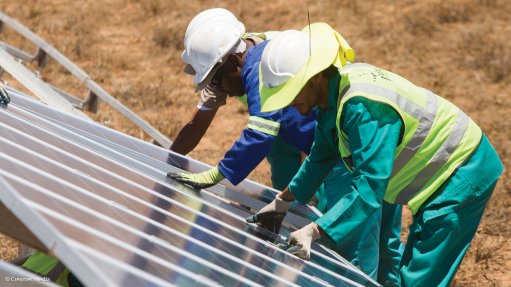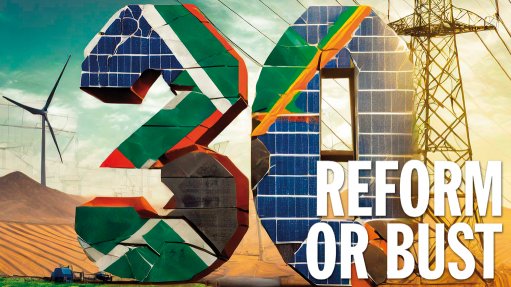Drought: more action, less rhetoric needed from business
Water expert Jo Burgess argues that there is need to promote good water stewardship among the businesses operating in South Africa
South Africa’s current drought affects people at home, but more important to our economy is the damage to businesses. The Western Cape is not the only place in trouble, and as a new El Niño season approaches, the effects will only worsen.
The story of the business sector and its water security is essentially the story of our urban water supply. Businesses are sensitive to drought, especially when key components of their operations are dependent on water of a specific quality and at specific times. However, some of the major water-related risks that businesses face are made worse by poorly functioning water supply systems. This is especially true in smaller municipali- ties. Although businesses (especially large ones) have voiced their concerns regarding water, limited active measures have been taken to mitigate these risks. Businesses sit at the interface of the water value chain and a particular product’s supply chain. Depending on where they sit, their risks are distinct. Therefore, it is not only about the water supply to a single company, but also the water supply to their workforce, customers and the community. Water for business is more than purely water for inputs. This is why businesses need to be good water stewards, and consider their role in water outside the factory fence.
Businesses, both large and small, are difficult to segregate into a specific sector. In this article, the business sector is considered to be all businesses that use water within a small city or town. Therefore, their consumption is considered to be urban in nature. As a result of the drought, businesses in towns or cities do not have secure access to water for their operations.
The National Development Plan highlights the important role of small businesses and cooperatives in achieving inclusive economic growth, and the fact that such enterprises are key to achieving the plan’s job-creation target for 2030. In 2010, South Africa had nearly six-million small companies; over 60% of the owners had left school before completing matric, while 58% of small business owners were women. Most small businesses are informal small, medium-sized and microenterprises.
The impact of a drought on the sector is dependent on the importance of water for various types of small businesses. For small businesses that are particularly dependent on water for their operations, water restrictions or supply interruptions impact on revenue and income and this threatens the business. The businesses that are most affected by droughts include food, hair- dressers, launderettes and car washes.
In the town of Thaba Nchu, where most small companies surveyed were in the informal sector and had a turnover of less than R50 000 a year, the most vulnerable were butcheries and grocery shops, which use water for keeping vegetables fresh. The drought negatively impacted on them; for instance, vegetables withered due to a lack of water and could not be sold. About 87% of the businesses reported losing over half their revenue because of the drought. One grocer stated that the impact of the drought was mainly experienced in the ablution facilities, where there was inadequate water for staff and product hygiene. The facility could only deliver poor service and this negatively affected customers and staff. As a short-term response, the grocer bought a 2 000 ℓ JoJo tank.
One taxi operator stated that the impact of the drought was mostly felt by his customers. Since they did not have money to afford taxi fares, there were very few customers asking for a ride (business was very poor). The lack of water also had an impact on sanitation: it was not possible to wash his taxi, which negatively impacted on custom.
A small-scale fashion designer stated that a consistent water supply was essential for ironing and washing. Since water was in short supply, she had to fetch it from a standpipe tap; although the tap was only a five-minute walk away, she would be in the queue for 30 minutes, wasting business time. The water she fetched was not sufficient for employees for bathing, drinking, cleaning and cooking. Thus, they had to make trade-offs: they had to stop bathing at work, with the saved water used for the business.
The impact of the recent drought on large businesses in South Africa has also been severe. The recent Carbon Disclosure Project (CDP) report on water states that 83% of respondents reported “that their direct operations are exposed to water-related risks, the highest of any sample in the world, with more than half of these risks expected to mani- fest within the next three years and with two- thirds of those risks having a financial impact of medium to high”. About 70% of respondents said they had already had their businesses damaged by water risks in 2015.
We need to promote good water stewardship among the businesses of South Africa. This may include helping businesses consider their role in the water system beyond their own operational needs. Each company represents a number of employees, customers and a community. These people require secure access to water for their businesses to thrive. Therefore, businesses should consider their role in supporting good water management as a long-term strategic investment into their businesses. No single business can do this alone.
We need to better understand our businesses and the risks they are facing. There are initiatives under way, such as the CDP water survey, but these are focused on large businesses. The Department of Small Business Development needs an analysis of the water-related risks to small businesses as a core component of their activities to ensure that small businesses do not suffer as a result of a drought.
We need to interrogate the response of government to businesses that increase their water efficiency. This is because, during times of a drought, when a blanket reduction in water use is effected, those that are the most efficient suffer the most. This is a perverse outcome which does not support the right behaviour. We need to consider how to reward good actions that companies undertake before there is a drought.
Dr Burgess is a research manager at the Water Research Commission
Comments
Announcements
What's On
Subscribe to improve your user experience...
Option 1 (equivalent of R125 a month):
Receive a weekly copy of Creamer Media's Engineering News & Mining Weekly magazine
(print copy for those in South Africa and e-magazine for those outside of South Africa)
Receive daily email newsletters
Access to full search results
Access archive of magazine back copies
Access to Projects in Progress
Access to ONE Research Report of your choice in PDF format
Option 2 (equivalent of R375 a month):
All benefits from Option 1
PLUS
Access to Creamer Media's Research Channel Africa for ALL Research Reports, in PDF format, on various industrial and mining sectors
including Electricity; Water; Energy Transition; Hydrogen; Roads, Rail and Ports; Coal; Gold; Platinum; Battery Metals; etc.
Already a subscriber?
Forgotten your password?
Receive weekly copy of Creamer Media's Engineering News & Mining Weekly magazine (print copy for those in South Africa and e-magazine for those outside of South Africa)
➕
Recieve daily email newsletters
➕
Access to full search results
➕
Access archive of magazine back copies
➕
Access to Projects in Progress
➕
Access to ONE Research Report of your choice in PDF format
RESEARCH CHANNEL AFRICA
R4500 (equivalent of R375 a month)
SUBSCRIBEAll benefits from Option 1
➕
Access to Creamer Media's Research Channel Africa for ALL Research Reports on various industrial and mining sectors, in PDF format, including on:
Electricity
➕
Water
➕
Energy Transition
➕
Hydrogen
➕
Roads, Rail and Ports
➕
Coal
➕
Gold
➕
Platinum
➕
Battery Metals
➕
etc.
Receive all benefits from Option 1 or Option 2 delivered to numerous people at your company
➕
Multiple User names and Passwords for simultaneous log-ins
➕
Intranet integration access to all in your organisation

















